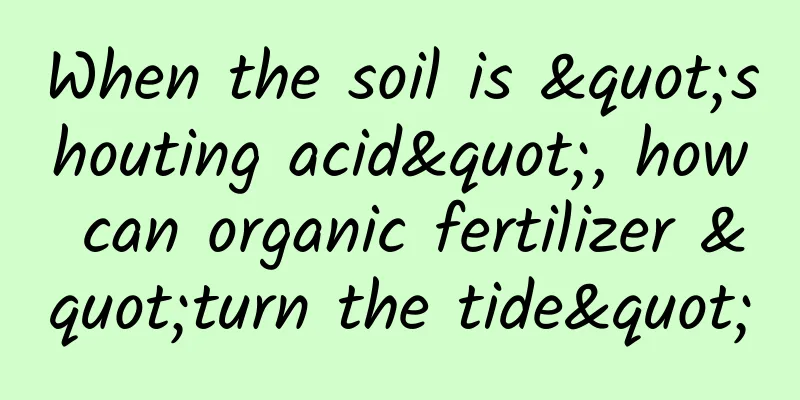When the soil is "shouting acid", how can organic fertilizer "turn the tide"

|
When the soil is "shouting acid", how can organic fertilizer "turn the tide" Soil is the cradle of life on Earth, and it nurtures the growth of all things. However, many soils are now facing health crises, and fertilization, as a key link in agricultural production, is closely related to soil health. For this reason, agricultural scientists at our national science education base Liuhe Base have conducted more than ten years of research. Now let the scientists explain the mystery to us. The agricultural scientist introduced to farmers today is Researcher Wang Jidong , who is the chief of the Soil Fertility and Plant Nutrition Innovation Team of the Institute of Agricultural Resources and Environment, Jiangsu Academy of Agricultural Sciences, deputy director of the Cultivated Land Fertilization Committee of the Chinese Society of Plant Nutrition and Fertilizer, director of the Jiangsu Soil Society, and dean of the Binhai Yellow River Ancient Channel Agricultural Industry Research Institute of Jiangsu Academy of Agricultural Sciences. He is a master's supervisor at Nanjing Agricultural University, Jiangsu University, Nanjing University of Information Science and Technology, and Qingdao Agricultural University, a state-sponsored visiting scholar (2016.1-2017.1, University of Western Australia, Australia), and a young editorial board member of "Journal of Pedology" and "Soil". He has presided over more than 10 projects, including the National Natural Science Foundation of China, the National Science and Technology Support Plan, the Jiangsu Province Key R&D Key Project, the Jiangsu Province Independent Innovation Project, and the Jiangsu Academy of Agricultural Sciences Basic Scientific Research Business Special Project, and participated in 3 national modern agricultural industry technology systems (sweet potatoes) and international cooperation projects. Relying on the basic long-term project of Jiangsu Academy of Agricultural Sciences (ZX(2021)5001), the National Sweet Potato Industry System Post Scientist Project (CARS-10-Sweetpotato), the Jiangsu Youth Fund and Key Project (BK20190259; BE2021378), the Jiangsu Independent Innovation Fund Project (CX(21)1009), etc., the team of researcher Wang Jidong has made a series of progress in the soil acidification effect and biogeochemical cycle of carbon, nitrogen and phosphorus under long-term different fertilization measures through 13 years of continuous monitoring at the Liuhe base of the academy. By studying the effects of different fertilization measures on soil acidification and its influencing factors under the wheat and sweet potato rotation model, it was revealed that long-term application of high-amount nitrogen fertilizers accelerated the soil acidification process, while the application of organic fertilizers alleviated soil acidification by increasing the soil cation exchange capacity, improving soil buffering capacity and slowing down the rate of magnesium ion decline. This provides a basis and support for mitigation and repair of accelerated soil acidification, reduced crop yield and deterioration in crop quality caused by long-term application of nitrogen fertilizers. In agricultural production, fertilization is a key link to ensure the healthy growth of crops, but did you know that different fertilization measures have completely different effects on the soil, especially in the crucial aspect of soil acidification? Long-term and large-scale application of nitrogen fertilizers will greatly accelerate the process of soil acidification. Nitrogen fertilizers contain ammonium ions and other components. When applied to the soil, ammonium ions will undergo nitrification under the action of microorganisms. In this process, ammonium ions are oxidized to nitrate ions and hydrogen ions are released at the same time. A large amount of hydrogen ions continue to accumulate, gradually breaking the original acid-base balance of the soil and turning the soil toward acidity. Moreover, this acidification process is long-term and has a cumulative effect. If nitrogen fertilizers are continuously used in large quantities in agricultural production, there will be more and more acidic substances in the soil, and the acidification rate will continue to accelerate. In sharp contrast to nitrogen fertilizer, organic fertilizer has excellent performance in alleviating soil acidification. Organic fertilizer can increase the cation exchange capacity of soil. The cation exchange process in the soil is like an "ion relay race". Various cations are adsorbed on the surface of soil particles. When the roots of crops need nutrients, the cations will be exchanged and the nutrients will be passed to the roots. Organic fertilizer can provide more exchange sites for the soil, allowing the soil to store more cationic nutrients, such as calcium, magnesium, potassium, etc., making the soil's "nutrient storage pool" more abundant. At the same time, organic fertilizer can significantly improve the buffering capacity of the soil. The buffering capacity of the soil is like a "pH regulating valve" that can resist the interference of external factors on the pH of the soil. After the organic matter in the organic fertilizer decomposes in the soil, it will form substances such as humus, which have strong acid-base buffering properties. When the acidic substances in the soil increase, they can react with the acidic substances and consume some hydrogen ions, thereby reducing the acidification of the soil. In addition, organic fertilizers also play an important role in slowing down the rate of magnesium ion decline. Magnesium ions are essential for maintaining soil structural stability and the normal physiological functions of crops. During soil acidification, magnesium ions are easily lost with acid leaching. Organic fertilizers can reduce the leaching loss of magnesium ions by increasing the adsorption capacity of soil particles for magnesium ions and improving soil structure, thereby slowing down the rate of magnesium ion decline. Long-term and large-scale application of nitrogen fertilizers accelerates soil acidification, which will bring many adverse consequences to crops. Soil acidification will destroy the balance of soil microbial communities and significantly reduce the number of beneficial microorganisms. These beneficial microorganisms originally undertook important tasks in the soil, such as decomposing organic matter and converting nutrients. The reduction in their number will affect the material cycle and nutrient conversion of the soil. At the same time, the soil structure deteriorates, the soil becomes compacted, the air permeability and water permeability decrease, and the ability to retain water and fertilizer also decreases. In such a harsh soil environment, the growth of crops is restricted, the yield decreases year by year, the quality of fruits deteriorates, and the taste and nutritional value are greatly reduced. Organic fertilizer provides strong support for solving these problems. Through the rational application of organic fertilizer, we can effectively slow down the rate of soil acidification and repair the already acidified soil. For example, in some plots where vegetables have been grown for a long time and the soil is severely acidified, after years of continuous application of organic fertilizer, the pH value of the soil has gradually become reasonable, and the yield and quality of crops have been significantly improved. Therefore, in agricultural production, we should attach importance to the use of organic fertilizer, apply fertilizer scientifically, protect the health of the soil, and ensure the sustainable development of agriculture. Therefore, reasonable fertilization can inject endless vitality into the soil. Nitrogen, phosphorus, potassium and other macronutrient fertilizers are like the "staple food" of the soil, providing basic nutrients for crop growth and ensuring that the crops are luxuriant and fruitful. Organic fertilizer is the "tonic" of the soil. It is rich in humus, which can improve the soil structure and make the soil loose and breathable, just like giving the soil a "deep breath" exercise. The ability to retain water and fertilizer is also enhanced, creating a comfortable home for microorganisms and promoting a virtuous cycle of the soil ecosystem. Copyright: National Science Education Base Jiangsu Academy of Agricultural Sciences Liuhe Base Editors: Shen Yesong, Zhang Dan Reviewers: Sun Jiaxiang, Yu Mingzheng Layout design: Shen Yesong Note: The cover image is a copyrighted image. Reprinting it may cause copyright disputes. |
<<: Humans learn throughout their lives, but the brain can only store 4GB?
>>: Many people drink these "teeth-corroding" beverages every day!
Recommend
Advanced Operations: How to design a user value system?
1. What is the user value system? The user value ...
6 Keyword Bidding Rules, Will You Still Worry About Lack of Traffic After Learning Them?
To put it simply, bidding means spending money to...
If iPhone really wants dual SIM dual standby, will you support it?
"Dual SIM dual standby" may not be a com...
Being deprived of physical strength, mental strength and even breathing, all because of this "traditional delicacy"
"...Okay, smile, smile at Pava, smile at the...
There are so many pots, how do you choose a good and suitable one?
For gourmets who believe in "do it yourself,...
Pixel-graphic games have no future? Developers don't think so
[[137394]] Blake Reynolds is an artist at indepen...
12 tips | Key points you need to know about creating advertising slogans
I won’t accept any gifts this year, and if I do, ...
How do we differentiate between storks, cranes and herons, all of which are very elegant?
Recently, the Oriental White Stork, known as the ...
How to improve the effect of information flow and double the conversion?
We all know that whether it is bidding or informa...
Unveiling the promotional activities of mainstream e-commerce platforms!
Nowadays, there are more and more e-commerce acti...
Unexpectedly! Paper that cannot be burned by an open flame at 500℃ is actually the insulating material in the "heart" of high-speed rail?
The traction drive system is an important part of...
[Popular Science of Chinese Military Technology] Why is it said that the reliability of ChatGPT in military applications needs to be verified?
The full name of GPT is (Generative Pre-trained T...
Teacher Qi's "Physical Store Douyin Account Traffic Growth Operation Course" systematically learns the methodology of Douyin account operation
Training course video lecture content introductio...
Is it expensive to produce the Chifeng bargaining mini program? Chifeng bargaining applet production cost and process
Chifeng bargaining applet production price 1. Dis...









